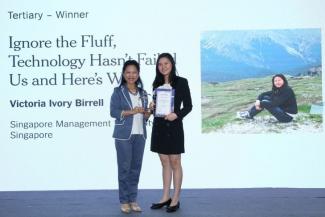
[Featured photo: Victoria Ivory Birrell, SMU social sciences student received her prize from Ms Helena Phua, Executive VP (Asia Pacific), The New York Times at the Award Ceremony held in Hong Kong in May 2019]
For the second year in a row, an SMU undergraduate takes the top spot at the New York Times Asia-Pacific Writing Competition. SMU’s social sciences student Victoria Ivory Birrell is this year’s tertiary category winner.
Organised annually by International New York Times (INYT), 2018’s theme was on “Digital Disruption” and Victoria’s essay “Ignore the Fluff, Technology hasn’t failed us and here’s why” addresses whether digital technology is disrupting our life and values, or whether it is creating new ways of living. Her opinion piece discusses how technology is not inherently synonymous with apocalyptic danger. Instead, it can make the once imagined, possible, and that education is the key towards successfully combating technology’s pitfalls.
Victoria first learnt about the writing competition from Ms Lara Pugh, her Programme in Writing and Reasoning (PWR) professor with the Centre for English Communication at SMU who had informed the class about it. Victoria then decided to participate as she has always been incredibly passionate about writing. She says, “My passion for writing stems from a young age and was ignited in high school when I joined our journalism activity called “East Stories”. I interviewed individuals who were vital towards the smooth operation of our school yet who often remain underappreciated like the cleaning lady and the security guard. Furthermore, I had recently completed my Opinion Piece assignment and therefore, felt particularly compelled to apply what I had learned from the feedback I had received from Ms Pugh to writing another opinion piece on a topic that was incredibly pertinent and relevant to me.”
As to why she decided on her topic of technology, she says, “Throughout my life, technology has been an indispensable tool that has truly propelled my learning to new heights. Technology proved its unlimited capabilities when I co-founded my own student-led technology conference named “TechLIFE” at age 13 where we had a 30-min Skype call with Apple Co-Founder, Steve Wozniak. Without technology, my participants and I would have been deprived of this irreplaceable experience. Drawing from this key moment in my life where technology had facilitated my new means of unconventional learning, I knew that I had to write about how technology had ultimately been a force for good. However, in my article I did not airbrush Technology’s narrative to feature only the positive, I also acknowledged how the rise of malicious disinformation posed a great threat to our societies and that greater education about technology is the key towards mitigating the threats that it poses.
Victoria travelled to Hong Kong in early May to receive her prize together with her mother. She says “the experience in Hong Kong was remarkable; the bustling life of the city makes you feel like you are part of a narrative that is larger than life. Interacting with the fellow awardees was an experience unlike any other. We had insightful discussions about our own opinion pieces and learned so much from each other that could not be replicated by any classroom. What was particularly empowering for me was the fact that all four awardees were women. All of the awardees were incredibly intelligent, driven and held themselves with such grace. Every single one of us did not think twice about sharing our insight on the pertinent issue of digital disruption and actively engaged with the topic while simultaneously being good listeners when others were speaking. Hence, the experience was fantastic as I got to learn from individuals who held their own and were inspiring.”
Victoria would like to thank her high school, United World College of Southeast Asia (UWCSEA) for injecting a sense of wonder into her and compelling her to ask questions and use her voice for something bigger than herself to shape a more progressive world. Second, she would like to thank SMU, specifically Lara Pugh, for being so immensely patient, supportive and generous throughout the entire process from the very moment she informed her that she wanted to participate in the competition right until the end when she informed her of her win. Third, her friends who constantly push her to be the best version of herself and finally, her parents who poured everything they had into her, read to her every single night and taught her from a young age the value and unstoppable power that a well-reasoned argument could have.
A Politics, Law and Economics Programme Student, Victoria enters her second year come August 2019. On her immediate plans, Victoria said she will embark on an Economics Summer Programme at The University of Cambridge and continues to volunteer at the Institute of Mental Health (IMH). She will also continue writing and to use her voice as a force for good.
You can read the essays by Victoria and other students on InK, SMU's institutional repository.
All photogrpahs are courtesy of The New York Times.